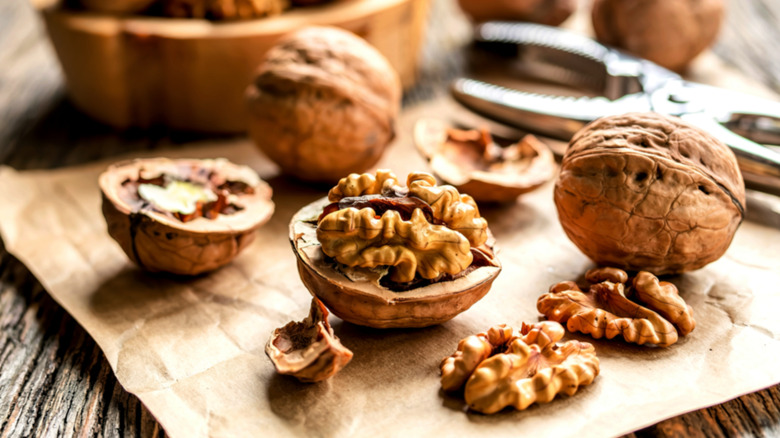Will Eating This Nut Actually Improve Your Sleep Quality?
Most everyone wishes they could sleep better at night. No matter what, many of us always seem to wake up wishing we could have gotten just a few extra Zs. One way people commonly try to improve their sleep is through adjusting their diet, like ingesting banana peel tea that supposedly has sleep-improving qualities (yes, that's really a purported use of leftover banana peels beyond composting). One food you might not have considered that purportedly helps you sleep is walnuts.
Per research published in the Journal of Food Composition and Analysis, walnuts have been proven to contain melatonin, a chemical that helps humans fall and stay asleep. Melatonin is produced in the human body by the pineal gland located in the brain. However, it's also present in many of the foods we eat, particularly plants. Melatonin supplements have been shown to help people with sleep problems fall asleep and stay sleeping.
So, do walnuts help us doze off? It's possible. In a 2024 clinical study on this very subject, daily consumption of 40 grams of walnuts was shown to improve sleep quality and raise melatonin levels. However, that doesn't mean you should start adding walnuts to your daily diet. There's not enough research at the time of writing to definitively say whether or not walnuts help each person sleep. Everyone's bodies are different, after all, and you're not guaranteed to experience similar results. Additionally, each gram of walnuts only has about 3.5 nanograms of melatonin, which is a drop in the bucket compared to some supplements.
Separating fact from fiction
If you want to sleep better, it's important to get the facts surrounding sleep and food straight. First, you may be familiar with the old myth that turkey makes you drowsy because of a chemical called tryptophan. While turkey does contain tryptophan (which does convert into melatonin and other sleep-inducing hormones like serotonin), it's not enough to actually make you feel sleepy. The sleepy feeling is actually attributed to the phenomenon popularly known as a food coma, where you feel a dip in your energy levels after eating a large meal.
You should also know that there are differences in the way our bodies process chemicals found in food versus supplements. We typically metabolize nutrients and hormones more efficiently when they come from food, in part due to the myriad of other things present in food that increases bioavailability (how much of a certain nutrient or substance we can absorb). In addition, melatonin supplements can frequently be mislabeled and may not actually contain the amounts of melatonin they say they do. So, don't reach for the melatonin gummies just yet.
To actually improve sleep, the best things to do include getting daily exercise, avoiding screens before bed, making your sleeping area comfortable, and creating a regular bedtime routine. And, of course, you should always consult your doctor if you're experiencing trouble sleeping, as well as before starting any kind of supplement or making significant changes to your diet to achieve better sleep.

